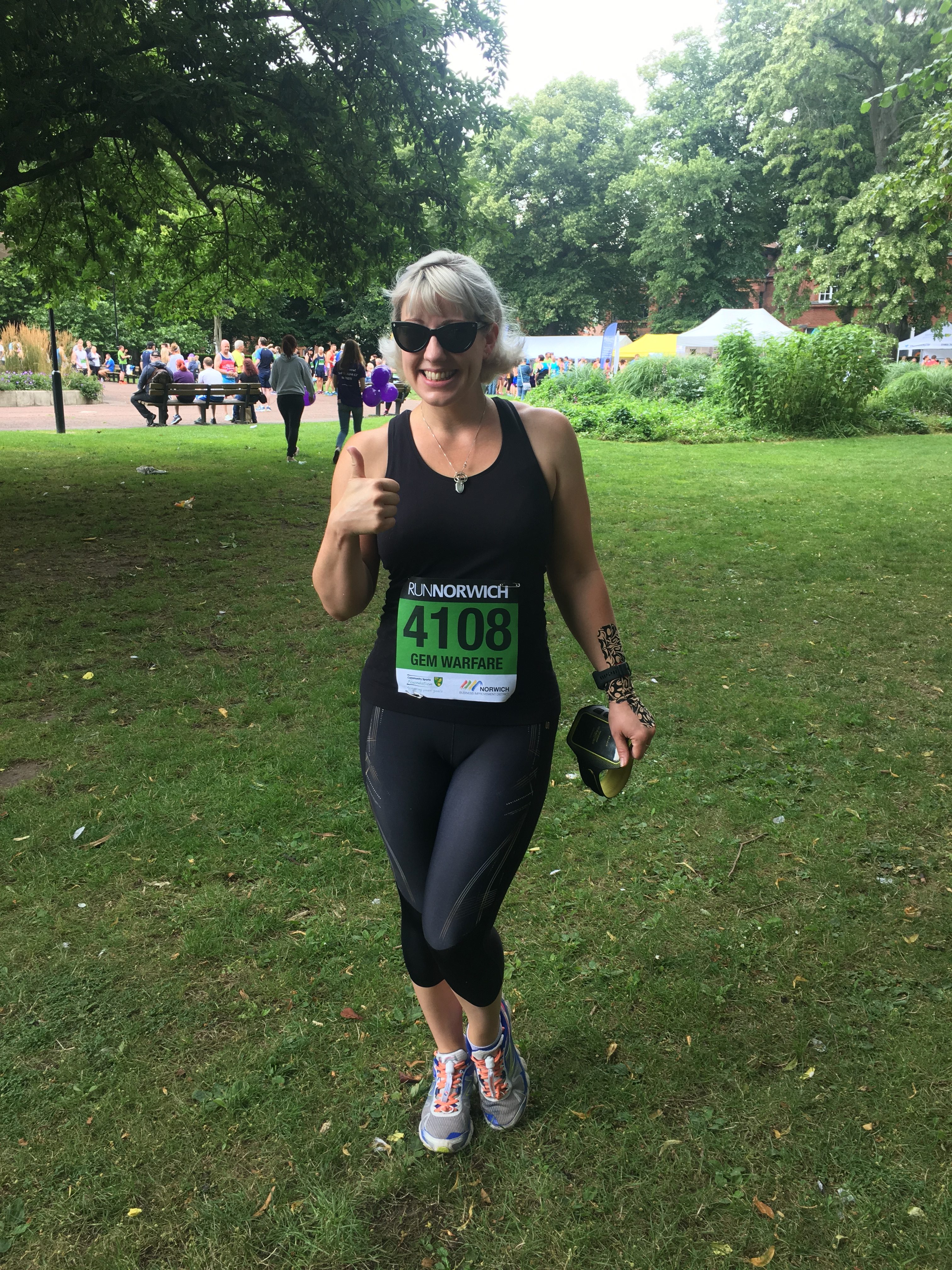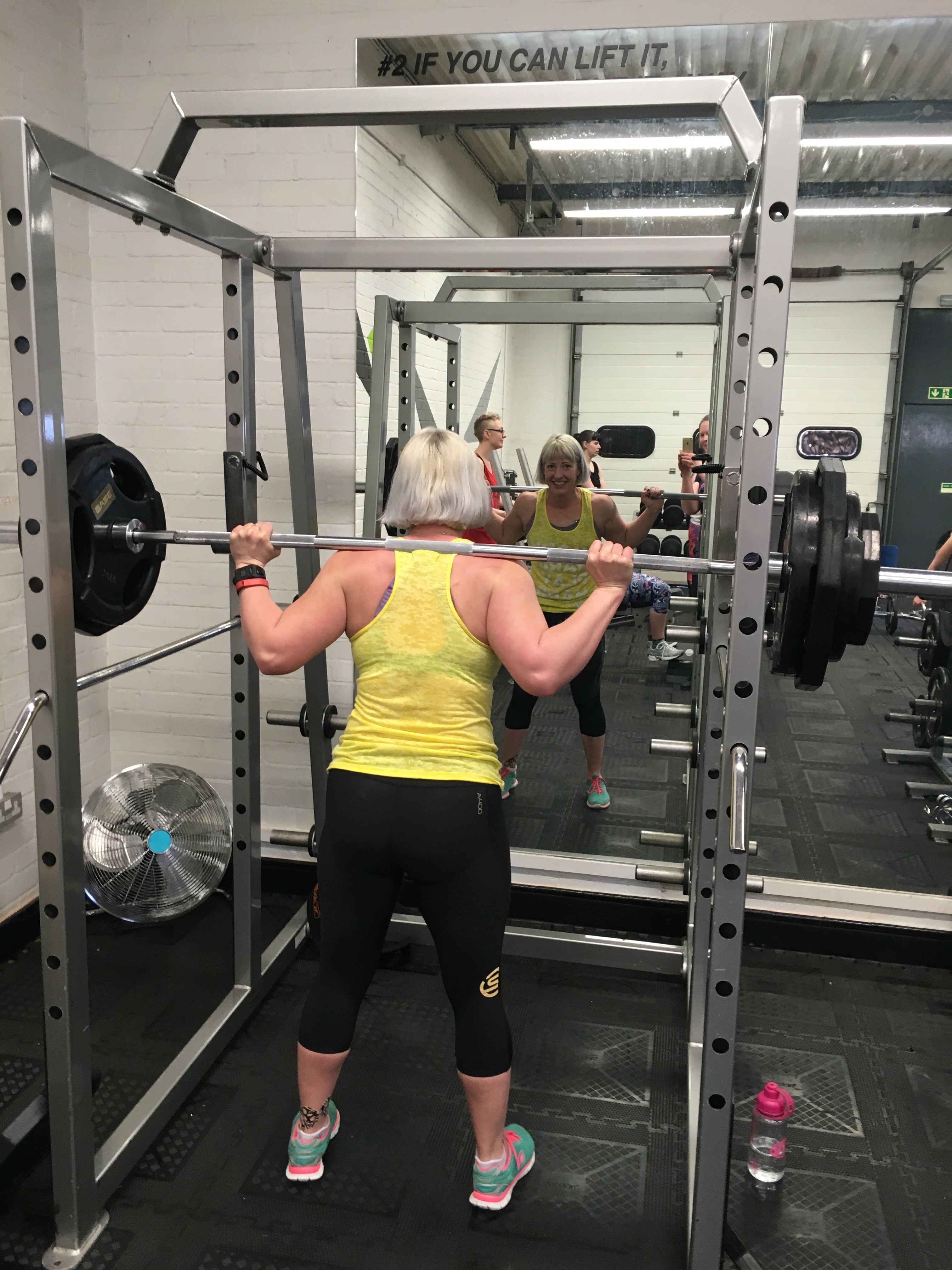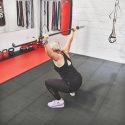Last week I shared a little bit of my early experiences with sport.
There are a lot of people who ask why women and girls aren’t more active and how we can engage them more. So as someone who’s got into sport a little later in my life I want to look back on why I missed out on all those years. What was it that failed to engage me?
On the other side of that story is looking at what it was that finally changed. When did it finally click and I became the woman with a work out wardrobe as big as her regular wardrobe, 4 pairs of running shoes and goals that include nailing an unassisted pull up?
The answer starts 5 years ago now. The year I started this blog in Summer 2012. Mr LLL and I decided we really needed to take some action, get fit and lose a bit of weight. So, on impulse, we looked for a 5k run we could do together. That automatically cut out all the Race for Lifes as they were women only, but eventually we tracked down a little local fun run called the Braydeston 5k and signed up.
So far this is a story that’s been repeated over and over and normally ends with me 2 years later in exactly the same position I started in.
I headed out for my first few runs wearing a 10 year old sports bra and equally old running shoes with a pair of pyjama bottoms that looked a little bit like a tracksuit. I downloaded a couch to 5k app and off I went.
And I HATED it.
I hadn’t figured out that running didn’t necessarily mean sprinting, and every time a run section appeared on the app I would go so fast that when they started to get longer I couldn’t sustain it and I felt like a failure. I also hated running around the streets near my house where local lads would lurk and shout. This attempt looked as doomed to failure as my previous ones.
What was different this time was 2 things. First, I had the support of Mr LLL, having a buddy to persuade me out for a run and to talk about it afterwards made a big difference. Secondly, I had signed up for a race. I couldn’t just quit as I’d spent money on this race, I’d also asked for sponsorship, and I was going to do it, goddammit.
So we found somewhere new to run. Rather than running around the streets we would drive out to a nearby lake that was about 2 miles round and makes a perfect running route. Quiet and with less shouting lads.
I gave up on the couch to 5k and discovered 2 new apps. The Nike+ app with GPS let me actually see how far I was running, and whether I’d done it faster than last time, and gave me a sense of achievement. The Zombies Run app was fun, it told me a cool Zombie story, plus it taught me to slow down. I would aim to run as slowly as possible, to JOG rather than run, so that when a Zombie chase popped up on the app I could pick up speed and sprint for a bit.
Gradually I started to enjoy it.
In around August 2012 I managed to run my first ever full 5k without stopping to walk and I felt amazing.
I started buying Runners World magazine, and for the first time in my life found somewhere that didn’t solely talk about exercise as a means of losing weight or getting toned. It talked about food as fuel, and ways to run faster and further.
I got fitted for proper running shoes, I bought running socks and lycra capri pants and a proper running bra, and by the time September and our 5k came around I felt like an actual runner. Not the fastest runner, but definitely a runner.

Then we signed up for a 10k a month later, then another 10k a month after that and by Christmas we were signed up for a Half Marathon in November 2013.
And by then it had kind of stuck.

Looking back I think there are 3 things that made me stick with it. First was that it was something Mr LLL and I did together. Even though we didn’t run together we could compare our times and chat about it. Second was the technology. Being able to to track times and feel a sense of improvement was a big deal for me. Thirdly was entering races. The kind of races we entered weren’t Race for Life type races. They were friendly, but had chip timing and published results. I checked them out first and whilst I knew I wasn’t going to come first, it made me determined not to be last, I didn’t want people to feel sorry for me, so I trained to make sure I finish in a definite middle to end of the pack kind of position rather than being a final straggler.
In May 2013 I went to see my first Roller Derby game, and a few weeks later a friend persuaded me to go along to a training session. I certainly wasn’t a natural by any means, but something about it appealed to my competitive side. You could learn skills at your own pace, but the sign offs process gave you a yard stick to measure yourself against. You weren’t just skating for fun, you couldn’t just give up on a skill because you weren’t any good at it, but not being any good at it was ok, as long as you were trying.

I’m not going to say it was easy. There were times when I was so upset with myself for not getting things that I cried. There were times when I watched other people completely nailing stuff and improving faster than me that I secretly wanted to ditch it. But I didn’t.
Roller Derby taught me to channel that competitiveness into a drive to be better, instead of giving up when I didn’t nail it first go. The culture was supportive, rather than intimidating. It felt like being encouraged to be better, rather than how I felt at school, which was that if you weren’t immediately good at something you were just shuffled out of the way to the sidelines.
Roller Derby made me want to be fitter, stronger and more flexible so I could be better. It made me work on my mental resilience as well.
Many women tell a similar story about Roller Derby. I know many women who’ve found team sports like Rugby or Netball later in life, but I think one of the things that felt different about Roller Derby to me was that it often attracts women with no sporting background, and welcomes them in. There was no assumption that you were already fit and athletic and coaches were willing to break things down into smaller chunks. We were all just working it out together.
I was introduced to weight lifting by Personal Trainer Paul Fawcett who organised strength & conditioning sessions to help our team work on cross training outside of Derby and I discovered that while I might not be very good at fast, I was ok at strong.
By the time I made a team I’d started to think of myself as a Roller Derby athlete, and that impacted how I thought of a whole host of things. It impacted how I thought of my body shape and size, the food I ate, and the training I did. I knew I felt weak and kitteny if I didn’t eat properly and I started reading about Sports Nutrition, and periodised training plans.

I stopped looking at exercise as some kind of calorie burning quick fix that would allow me to eat more pizza, or punish me for already eating pizza, and started looking at it as means of improving my body composition, strength and preventing injury.
I thought about progression. Starting small and building up. And that’s how it gradually changed.
Recently I read this article on Elle.com, and the story felt very similar to mine. She engaged the help of a motivation psychologist to help her find her fit, I found mine through Roller Derby, but I really believe there’s a way for every one who thinks they hate exercise to find that way that makes it work for their life and stop thinking about it as an all or nothing thing linked with feelings of guilt and failure.
These posts might be a little self-indulgent. I don’t have any answers, there’s no magic solution. I just felt like it was a story I wanted to tell. Maybe a reassurance to someone that things can change, an inspiration to get back out there and try something new, or just a spark to tell their own story.
I’m still never going to be one of those long-limbed insta-perfect fitness goddesses with swingy pony tails, but with tiny changes and consistency has come a big change in my mind set that’s helped me find my love of exercise.

Comments
One response to “Women in Sport: Finding my Fit”
Hey there, iron sharpens another, you just did. THANK YOU. Thanks for sparing your time to share such an inspiring story, you never know how important it is. I echo your advice that we must stop looking at exercise as some kind of calorie burning quick fix but rather as a means of improving my body composition, strength and preventing injury. Thanks to your sentiments here, I have learned the next steps in the progressions of some of the exercises.